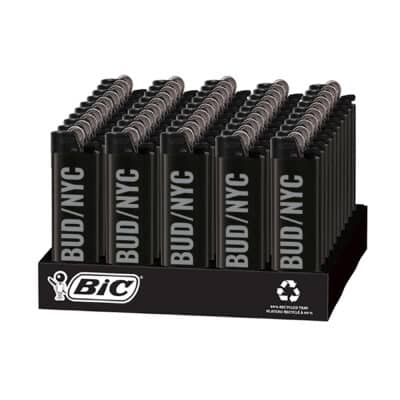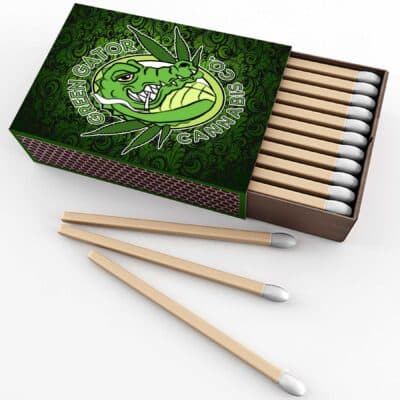Lighters vs. Matches for Lighting Pipes: Which is Better?
Smoking a pipe is more than just lighting tobacco—it’s a ritual. Choosing between lighters and matches for lighting your pipe affects not only ease of use but also flavor, experience, and cost. Both have their loyal followers, and each has unique pros and cons. Whether you’re a beginner or a seasoned pipe smoker, here’s a detailed breakdown to help you choose the best option for your routine.
1. Ease of Use
 Lighters:
Lighters:
Lighters, especially pipe-specific lighters, are designed for convenience. You get instant flame, no waiting or prepping. Many pipe lighters feature an angled or soft flame, perfect for directing fire into the bowl without burning your fingers. Refillable lighters (like custom clipper lighters) are especially easy to operate.
Pros:
- One-handed operation
- Instant ignition
- Wind-resistant (torch models)
Cons:
- Requires fuel or charging
- Potential for mechanical issues over time
Matches:
Matches, while traditional, take more time and skill. You need to strike them, let the sulfur burn off (important for flavor), and then position them over your bowl. Long wooden matches are preferred for pipes—they burn longer, giving you time to properly light your tobacco.
Pros:
- No mechanical parts
- No need to refill or recharge
- Can be tricky in wind or damp environments
- Need to carry multiple matches for long sessions
Verdict:
Lighters win for ease and speed. Matches require more effort and finesse, but some enjoy that.
2. Flavor Impact
Lighters:
Some pipe smokers claim lighter fuel (especially in Zippos) can affect the taste of tobacco. While this can be minimized by letting the lighter burn for a second before lighting your pipe, the initial odor of butane or naphtha can impact flavor for the first few puffs.
Modern butane lighters, especially refined butane, leave minimal residue or odor. Many smokers prefer these over fluid-based lighters for flavor purity.
Pros:
- Butane is clean-burning
- Fast ignition minimizes flavor taint
Cons:
- Zippo-style fluid may add slight taste initially
Matches:
When used correctly (letting sulfur burn off), matches are often said to preserve the true flavor of the tobacco better than lighters. Wooden matches especially give a neutral, clean flame, enhancing the pipe’s flavor.
Pros:
- Clean, natural burn
- No chemical taste from fuel
Cons:
- Poor-quality matches may affect flavor if not burned properly
Verdict:
Matches slightly edge out lighters in flavor, especially for purists. But with quality butane lighters, the difference is minimal.
3. Cost Over Time
Lighters:
Initial cost for a quality pipe lighter can be $20–$100+, but it’s refillable and lasts for years. Fuel (butane or fluid) and flints/wicks cost extra but are low recurring expenses.
Pros:
- Long-term investment
- Low maintenance cost over time
Cons:
- High upfront cost for quality lighters
- Occasional repairs/replacement parts
Matches:
Cheap upfront, but over time, match costs add up. Bulk wooden matches can be affordable, but specialty pipe matches are pricier. Frequent smokers may use dozens per week, increasing costs.
Pros:
- Low initial cost
- No equipment maintenance
Cons:
- Ongoing replacement costs
- Waste generation (used matches)
Verdict:
Custom Matches are cheaper short-term. Lighters are more cost-effective long-term.
4. Reliability and Consistency
Lighters:
Good-quality lighters provide consistent performance, indoors and outdoors. Torch lighters work well in windy conditions, while soft flame lighters are ideal for controlled indoor use.
Issues:
- Can fail if out of fuel
- Mechanism can jam or wear
- Altitude and cold can affect butane lighters
Pros:
- Reliable ignition
- Wind-resistant models available
Cons:
- Needs regular refueling/maintenance
Matches:
Matches can fail to ignite in damp or windy environments. Even in ideal conditions, a match might burn too quickly, forcing a relight. Keeping matches dry is crucial.
Pros:
- Simple—no moving parts to fail
Cons:
- Easily affected by wind and moisture
- Short burn time
Verdict:
Lighters win for reliability, especially outdoors or during travel. Matches are better suited for controlled environments.
5. Tradition and Aesthetic
Lighters:
Lighters offer a sleek, modern feel. Brands like Zippo, IM Corona, and Old Boy even have a vintage aesthetic, appealing to collectors. The ritual of flipping open a lighter, the click sound, and refilling can feel just as personal as striking a match.
Pros:
- Personal style and brand options
- Collectible models
Matches:
For purists, matches represent tradition. The ritual of striking a match, watching the flame catch, and carefully lighting your pipe brings a calming, old-school charm to the experience.
Pros:
- Timeless ritual
- Simple, peaceful process
Cons:
- Less convenient, more work
Verdict:
Matches win for tradition and aesthetics. Lighters offer more options for style and long-term ownership pride.
Final Thoughts: Which One is Better?
| Category | Lighters | Matches |
|---|---|---|
| Ease of Use | Quick, convenient | Slower, more effort |
| Flavor Preservation | Good (butane); mixed (fluid) | Excellent |
| Cost (Long-Term) | Higher upfront, low over time | Low upfront, adds up |
| Reliability | High (esp. butane/torch) | Low (weather-dependent) |
| Tradition/Aesthetic | Modern, collectible | Classic, nostalgic |
Bottom Line:
- Casual or outdoor smokers → Lighters (for speed and reliability)
- Flavor-focused, ritual-loving smokers → Matches (for purity and tradition)
- Serious pipe smokers? Have both. Use matches for flavor and ritual, and keep a lighter handy for convenience.
Whichever you choose, the goal is the same: a smooth, enjoyable smoke.


